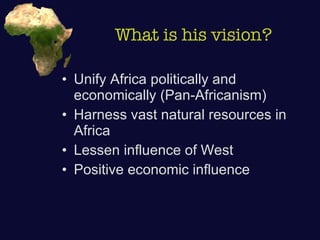Decolonization - Africa
- 1. Decolonization in Africa World History
- 2. The Vision of Kwame Nkrumah
- 3. What is his vision? Unify Africa politically and economically (Pan-Africanism) Harness vast natural resources in Africa Lessen influence of West Positive economic influence
- 4. End of an Empire? “The wind of change is blowing through this continent, and whether we like it or not, this growth of national consciousness is a political fact. We must all accept it as a fact, and our national policies must take account of it.” - British Prime Minister Harold Macmillan in 1960 to the South African Parliament What is the significance of this statement to the British Empire?
- 7. Internal Challenges Tribal allegiances Illiteracy / under developed education system No tradition of ongoing political leadership in modern times Religious differences Diverse geography and climate Established social hierarchies
- 8. External Challenges Economic dependence on former colonial powers Western investments remain - what is the impact of this? Cold War influences
- 9. Road towards independence Post-WWII - a focus on self-determination in Europe Colonialism seemed to contradict the spirit of the Allies fight against Nazi Germany and Fascist Italy Over 200,000 Africans had fought in Europe and Asia for the Allies’ freedom and democracy – most noticed the contradiction
- 10. Road Towards Independence Most Europeans planned a “long transition” period to independence By mid-1950’s pace increased 1960 considered the year of Africa with so many nations gaining independence
- 11. Independence Two major methods in Africa: Negotiated Independence: Long or short term deal between European power and African colony - could be violent or non-violent Incomplete Decolonization: White settler minority population given political power - could be violent or non-violent
- 12. Settler Colonies Different obstacles met by settler vs. non-settler colonies - what might they be? What is the difference? Settler colonies in Algeria (one million) and Kenya (40,000) pushed governments to defeat nationalist uprisings
- 13. What is the cartoon trying to say? What perspective is it conveying?
- 14. Kenya
- 15. "We refused to do this work. We were fighting for our freedom. We were not slaves. ... There were two hundred guards. One hundred seventy stood around us with machine guns. Thirty guards were inside the trench with us. The white man in charge blew his whistle and the guards started beating us. They beat us from 8 am to 11.30. They were beating us like dogs. I was covered by other bodies - just my arms and legs were exposed. I was very lucky to survive. But the others were still being beaten. There was no escape for them.” What does this sound like?
- 16. Settler Colonies Both Kenya and Algeria uprisings would be eventually smashed Weariness and new anti-colonial sentiments lead to independence anyway Most French Algerians leave, most British Kenyans stay
- 17. Non-Settler Colonies Non-settler colonies moved more quickly towards independence - why? Gandhi and India became a model for much of Africa Ghana under Nkrumah was first Sub-Saharan African majority government to gain independence in 1957
- 18. Impact of the Cold War Soviet pushed anti-colonial movement - offered assistance United States wanted access to African markets (why were they closed before?) AND to prevent the spread of communism. When West refused to help nationalists, they turned to the Soviet Union
- 19. Impact of the Cold War Anti-communist stance bought African governments resources and support - even those with institutionalized racism (South Africa) and dictators (Zaire/Congo) Soviets provided limited military aid and education opportunities - had no “plan” for Africa
- 20. Results of Decolonization Non-revolutionary - elites gain power, then favor supporters Economic dependence on west coupled with political corruption cripples attempts to diversify economy - stuck in same pattern
- 21. Results of Decolonization Initial political parties reflected ethnic, regional, or religious groups - few true national parties Power often gained by corrupt African “strongmen” (dictators) who ignored the social needs of people Large loans to modernize economies squandered by those in power - leave little progress, lots of debt
- 23. South Africa- The Exception White minority gain independence in 1910 - some 4 million whites In 1948 the government enacted an extreme form of racial segregation called apartheid The African National Congress (ANC) opposed measures
- 24. South Africa- The Exception Gov’t takes strong anti-communist stance - West ignores apartheid Nelson Mandela sentenced to life in prision for ANC actions 1980’s apartheid final ends Mandela becomes first African president Relatively peaceful transfer of power
- 25. What happened to Nkrumah’s vision? Why did it fail? Did it ever have a chance?
























